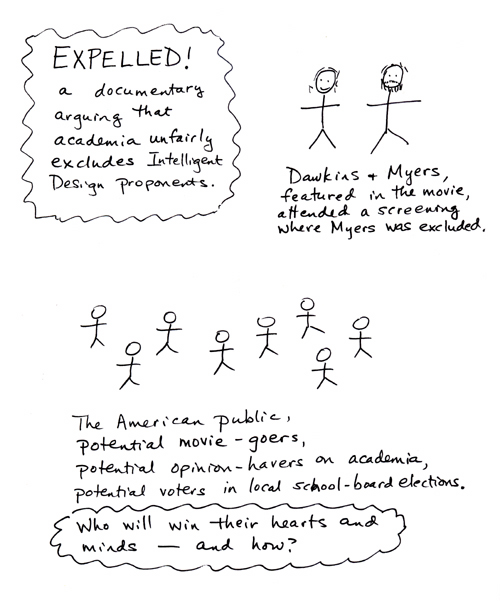Chris Mooney lays out the argument behind “framing”. I give my thoughts, item by item.
Category Archives: Scientist/layperson relations
A message about science worth communicating to the public.
In light of all the recent discussion about the “framing” of the Expelled! expulsion, it occurs to me that maybe part of the reason that the argument seems so unproductive is that the parties involved haven’t really agreed on what, exactly, they’re trying to communicate to the public at large.
Here’s my suggestion for a message worth communicating clearly: science isn’t politics.
Scientists call for public action in support of research with animals.
For those who have been following the activities of “animal rights” activists, including their attacks of the homes of researchers — and the reticence of the public in the face of such violent attacks — a recent Commentary in Biological Psychiatry [1] will be of interest. In it, a number of scientists call on their scientific peers to actively engage in dialogue with the public about what scientific research with animals actually involves and why it is important.
From the commentary:
Movie screening expulsion: whose hearts and minds are up for grabs?
Maybe you heard the news that PZ Myers and Richard Dawkins went to a screening of the documentary Expelled! in Minneapolis, except that, because he was recognized, PZ Myers was barred from the screening (despite having signed up ahead of time like the other attendees). Here’s the New York Times story, and Greg Laden has collected roughly a bajillion links to blog posts in the aftermath of the incident. The big debate seems to be whether Myers ought to have brought attention to the fact that he was barred from the screening, or whether he should have just gotten a haircut at the mall to pass the time until it was over.

Scenes from the science fair.
Following up on an earlier post, I wanted to say a little about the Synopsis Championship that took place last week. It’s sort of a judge’s-eye view of the fair — from a very enthusiastic and impressed judge.

If the science pipeline breaks, the rest of us get hurt, too.
A bunch of other bloggers are discussing the recent statement A Broken Pipeline? Flat Funding of the NIH Puts a Generation of Science at Risk (PDF). I thought I’d say something about the complexities of the situation, and about why non-scientists (whose tax dollars support scientific research funded by the NIH and other government agencies) should care.
The general idea behind funding scientific research with public monies is that such research is expected to produce knowledge that will benefit society. There are problems that non-scientists cannot solve on their own, so we pony up the resources so that scientists can apply their expertise to solving them. As we’ve discussed before, tax-payers seem most interested in the payoff of the research — the knowledge with practical application.
But you can’t get that payoff without scientists.
Science fair judges needed.
For readers in the greater San Jose (California) region, I wanted to pass along a call for judges for the Synopsis Championship, scheduled to take place next Wednesday, March 12. Judges will be doing their thing from noon to 4:30 PM at the McEnery Convention Center in downtown San Jose. (Judges will be served a free lunch starting at 11:30, however.) Here are the details on the judging talent they’re looking for:
Should researchers share data?
A colleague of mine (who has time to read actual printed-on-paper newspapers in the morning) pointed me toward an essay by Andrew Vickers in the New York Times (22 January 2008) wondering why cancer researchers are so unwilling to share their data. Here’s Vickers’ point of entry to the issue:
A tangle of controversy — and a plea to start untangling.
You’ve probably heard that UCLA scientist Edythe London, whose house was earlier vandalized to the tune of tens of thousands of dollars by animal rights activists, has once again been targeted. This time an incendiary device was left on her front door.
Abel and Mark weighed in on this appalling use of tactics to terrorize a scientist doing work on approved protocols — protocols that had to meet the stringent standards imposed by federal regulations. But while the NIH and the odd newspaper columnist stands up to make the case for animal use in medical research and against the violent intimidation of medical researchers, there seems not to be much in the way of public outcry.
Do people really feel like firebombing is a legitimate means of persuasion?
My guess is that they don’t. However, some of the details of the situation as described in a recent article in the Los Angeles Times may explain why the public is conflicted. Beyond animal use, the area of London’s research and the source of her funding seem to be raising discomfort, creating a tangled knot of controversy that’s begging to be untangled.
Graduate students: NSF Debating Science program.
I’m passing on information about a program sponsored by the National Science Foundation for graduate students. The program, organized by the University of Montana Center for Ethics, is called Debating Science 2008, and here’s how it’s described on the announcement:
